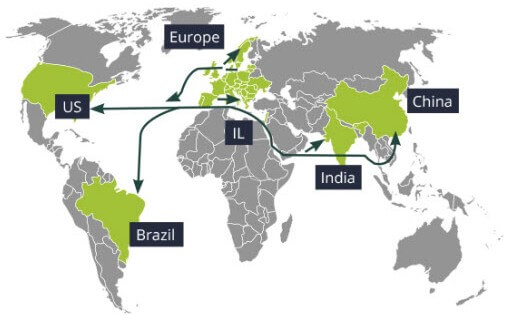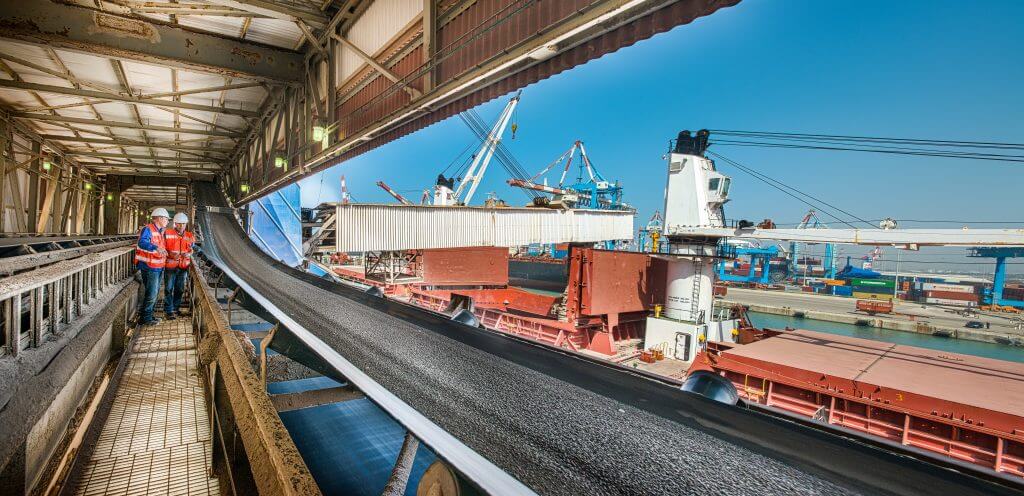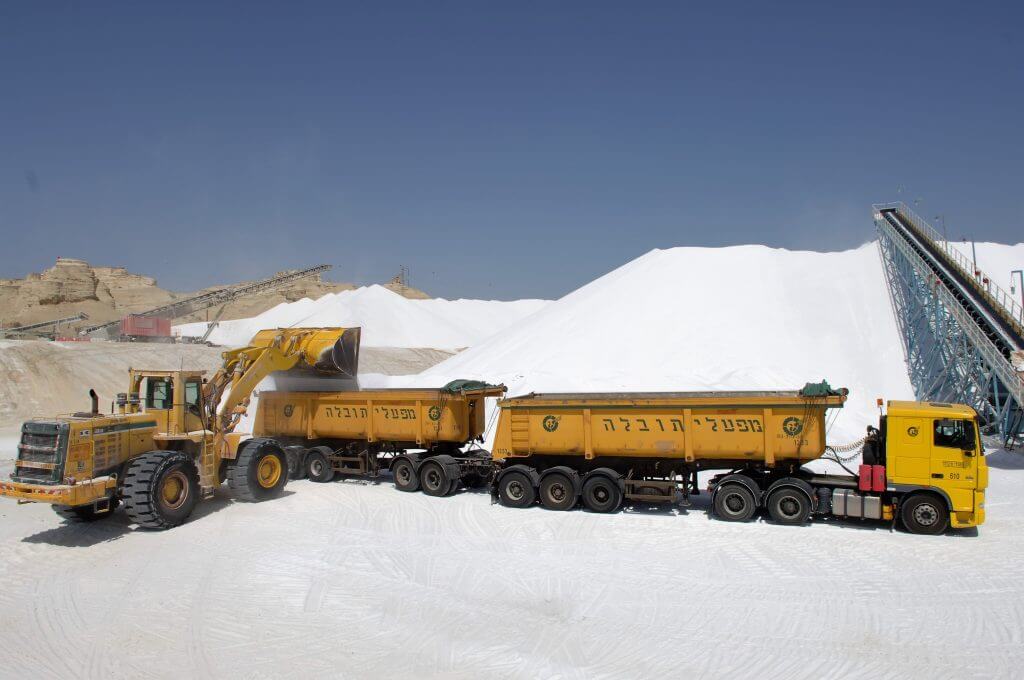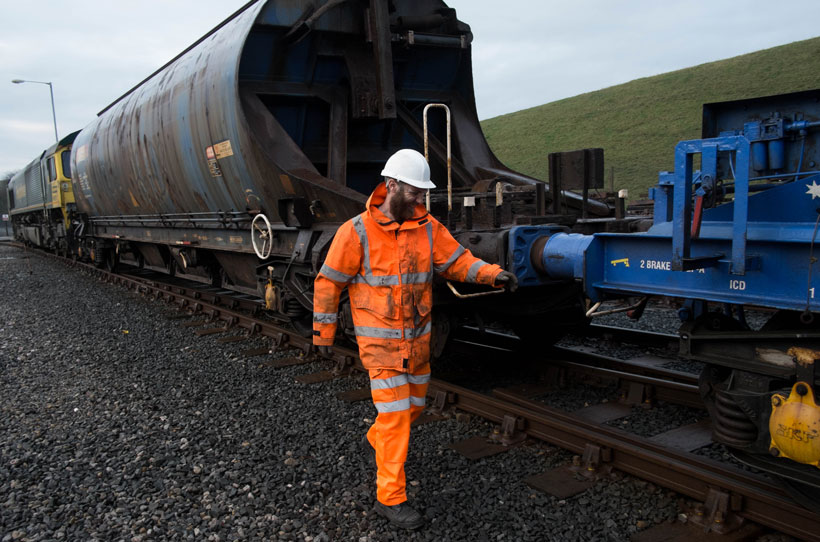Logistics & Distribution
For more information on our logistics and transportation infrastructure please see ICL 2018 Annual Report pp.130-132.

ICL benefits from the proximity of its facilities to developed economies as well as to emerging markets
Distribution Network

Israel
Most of ICL’s products in Israel are transported from Mishor Rotem by rail to either the Ashdod port or by road to the Eilat port. Part of the output of ICL Dead Sea is transported by a conveyor belt from the Sdom site to the railhead located at Tzefa in Mishor Rotem, and from there the output is transported to the Ashdod port. Metal magnesium is transported by trucks from the Company’s site in Sodom to the railhead at the Tzefa site. Thereafter, it is transported by train to the Haifa / Ashdod ports.
From Eilat, ICL’s products are transported by ship to markets in the Far East, and from Ashdod, they are transported by ship to Europe and South America.
In addition, the Company also transports some output produced at the Dead Sea by freight trucks, mainly to the Eilat port. The port of Eilat is located in the far south of Israel on the Red Sea coast, approximately 180 kilometers of Rotem and 200 kilometers south of Sdom. Shipments exiting the Eilat port are to the Far East, whereas sales to Europe, North and South America exit from the Ashdod port.

ICL’s wholly owned subsidiary ICL Tovala is responsible for transporting phosphate rock from the Oron and Zin processing facilities in rigid freight trucks and trailers.

Spain
ICL Iberia Iberpotash (IBP) transports it’s mined the production plants. Ore is taken by 25-ton road haulage trucks and a conveyor belt from the Cabanasas and Vilafruns mines to the Suria and Sallent plants, respectively. After the processing is completed, various quantities of Potash and different types of salt are produced. The final products are transferred directly to the customers by truck or through a designated railway line from the mines to the Barcelona port.
Most of the shipments of ICL Iberia (IBP) are made through a terminal it owns at the port of Barcelona (Trafico de Mercancias – Tramer).
A truck fleet with towing equipment is used to transport the salt from the mine. Up to 120 trucks of salt per day are dispatched from the mine to the port.
ICL Iberia (IBP) owns and maintains approximately 1.5 kilometers and 3 kilometers of standard gauge railway at Suria and Sallent plants, respectively, that connect to the regional rail network. Up to three trains leave on a daily basis having a total payload capacity of 800 tonnes, spread out over about 20 freight cars. In the coming years the rail network is expected to expand to 24 freight cars of 1,000 tonnes and up to seven trains a day. The rail route for potash transport from Suria and Sallent to the terminal in the port of Barcelona comprises an about 80 kilometer rail route.
ICL Iberia (IBP) owns and operates its own port facilities, which consist of bulk potash and salt storage facilities, comprised of freight‑car and rail‑truck conveyor unloading facilities and product storage warehouses.
The facilities of the port of Barcelona are managed by ICL Iberia’s subsidiary Tramer and comprise an area of 13 thousand square meters.
As part of the plan for increasing ICL Iberia’s (IBP) production capacity, an upgrade is being made of the logistical infrastructure at the mine (entrance ramps into the mine), the factories and the Company’s berth in the Barcelona port, in such a manner that will allow production, transport and export of about 2.3 million tonnes of potash and salt per year.
United Kingdom

The Boulby mine in the United Kingdom is connected by a network of roads running over 11 kilometers southward from the mine entrance, as well as a network of underground roads extending 15.5 kilometers from the mine entrance in the direction of the North Sea. Approximately 80 kilometers of underground tunnels are still open to support present production. The mine has easy access to the national road and train transportation routes.
Pursuant to agreements with the North Yorkshire National Parks Authority, the total transport movements by means of the network of roads from site to site are limited to a maximum of 150 thousand tonnes per year and a maximum of 66 road wagons per day (no road movements are allowed on Sundays or bank holidays).
The mine has a large network of conveyor load-out systems which carry potash, polyhalite and salt.
Eight trains per day transport rock salt, potash and Polysulphate™ to the Tees Dock. Most of the output is used as a component of agricultural fertilizers, where a large quantity thereof (about 50%) is exported by sea from the Tees Dock seaport to European Union countries and other customers overseas. Rock salt is taken by train to the Tees Dock, and transported by ship to English and Scottish east coast ports for sale to local authorities for de-icing roads.
ICL UK leases and operates three principal storage and loading facilities: the Tees Dock facility, which is located on the Tees River, and two additional storage facilities that are connected to the iron rail – Cobra and Ayrton Works in Middlesbrough.
China
The YPH JV includes the Haikou mine, several factories for production of various types of fertilizers located close to the Haikou mine and two plants for production of – one located close to the Haikou mine and the fertilizers factory and the other situated proximate to the Kunming airport.
Most of the transport of the raw materials from the Haikou mine to the acid factories is executed via pipeline (slurry), whereas a small part of the raw rock is transported by trucks.
Most of the output sold to the local market is transported from the fertilizers factory directly to the customers in North China by train, as well as through marine shipment, mainly from two exit ports (Beihai and Fangchengang). These ports are also used for import of sulphur. A small part of the output sold is transported to customers in the Yunnan region.



